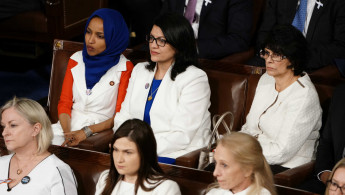Israel to allow Tlaib-Omar visit 'out of respect for Congress'
The congresswomen have been approved to visit the Israeli state despite their support of the Boycott Divest and Sanction movement, Haaretz reported on Friday.
“Out of respect for Congress and the great alliance between Israel and America, we would not deny entry' to pro-BDS congresswomen,” US envoy to Israel Ron Dermer said.
The news came after US President Donald Trump on Wednesday launched the latest in a series of racist and xenophobic attacks on four congresswomen of colour, targeting in particular Somali-American Omar.
"Tonight I have a suggestion for the hate-filled extremists who are constantly trying to tear our country down," Trump told the crowd at a rally in North Carolina, a swing state he won in 2016 and wants to claim again in 2020.
Read more: Tlaib-Omar congressional trip to Palestine is a nightmare for Netanyahu
"They never have anything good to say. That's why I say, 'Hey if you don't like it, let 'em leave, let 'em leave.'"
The president's fresh attack on Omar, linking the congresswoman to extremist group Al-Qaeda, was met with an uproarious response from the crowd: "Send her back! Send her back!"
The crowd's response mirrored a controversial racist tweet by Trump that set off a firestorm on Sunday.
The president had said that four freshmen Democrat congresswomen of colour - Omar, Alexandria Ocasio-Cortez, Ayanna Pressley and Rashida Tlaib - should "go back" to their home countries.
Three of them were born in the United States. Pressley is African-American, Ocasio-Cortez is Puerto Rican-American and Tlaib is Palestinian-American.
Omar was born in Somalia but fled to the US as a refugee when she was a child, later becoming a US citizen almost two decades ago.
Read more: Using Israel to justify his racist attacks, Trump sets a dangerous precedent
Trump also alleged the four women were "anti-Israel", "anti-USA", and "pro-terrorist".
Brushing off the uproar the widely-condemned tweet, Trump said sarcastically "so controversial".
Firing at the legislators one at a time, Trump raised what he deemed offensive comments by each woman and declaring: "I think in some cases they hate our country."
Taking comments by the Somali-American congresswoman out of context, the president made Omar out to be an extremist sympathiser who had voiced "pride" for Al-Qaeda.
Trump quoted Omar as having said: "You don't say 'America' with this intensity. You say 'al-Qaeda,' it makes you proud. Al-Qaeda makes you proud. You don't speak that way about America."
In a 2013 interview, Omar described how a former professor of hers had pronounced the names of extremist groups with a "menacing, intense" tone, allegedly in order to raise suspicions about Muslims as a group.
After denouncing each Democrat legislator, the president declared: "If people want to leave our country, they can. If they don't want to love our country, if they don't want to fight for our country, they can."
The House of Representatives on Tuesday formally voted 240-187 to condemn Trump's earlier comments.
Republican lawmakers have been reluctant to criticise the president over his comments.
While a USA Today poll found 68 percent of people found Trump's comments offensive and 65 percent believed the comments were racist, 57 percent of Republicans polled said they agreed with Trump’s tweets. Only 45 percent of Republicans said they believed telling minorities to "go back home" was racist.
Follow us on Twitter: @The_NewArab





 Follow the Middle East's top stories in English at The New Arab on Google News
Follow the Middle East's top stories in English at The New Arab on Google News


